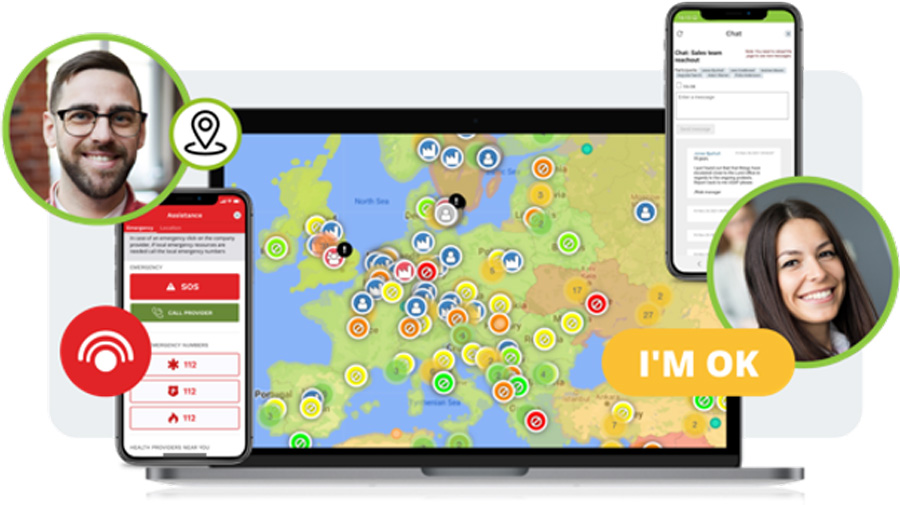Securing your employees’ journey in a world on the move with proactive travel safety and risk preparedness
In the tapestry of today’s globalized world, the realms of business and tourism frequently propel individuals into diverse environments across the globe, each with its unique spectrum of risks. The advent of recent events—pandemics, political unrest, natural disasters, and terrorist activities—has propelled the concept of travel risk management to the forefront of travel planning. With heightened awareness of the complexities and dangers of global travel, the need for effective TRM strategies has never been more pronounced.
What is Travel Risk Management?
Travel Risk Management is the comprehensive process of identifying, evaluating, and mitigating risks associated with travel. Whether for business or pleasure, it encompasses everything from pre-travel preparation to in-trip support and emergency response. It is an essential practice that ensures not only the safety of the travelers but also the continuity of travel operations.
Key components
- Risk Assessment: This involves analyzing potential risks at the destination, which may include political instability, health hazards, environmental conditions, and cultural barriers.
- Planning and preparation: The development of clear policies and procedures to prepare travelers effectively, including security provisions and training on how to respond to different types of emergencies.
- Real-time monitoring: Leveraging technology and intelligence services to keep an eye on emerging risks and adapt travel plans dynamically.
- Assistance and emergency response: Establishing unambiguous communication channels and providing access to assistance services during emergencies are critical for an effective TRM.
Importance of Travel Risk Management: Company’s Duty of Care and Best Practices
For HR managers and CEOs, understanding and implementing a robust Travel Risk Management strategy is not just about mitigating risks; it’s about affirming the company’s values and commitment to its most valuable asset—its people.
Incorporating the Duty of Care obligations that companies hold toward their employees, especially in the context of travel, adds another layer of importance to Travel Risk Management. This duty extends beyond basic legal requirements, embodying a moral and ethical commitment to the health, safety, and security of employees while they are away from their primary workplace.
A proactive TRM strategy not only protects the well-being of travelers but also minimizes disruptions and can be life-saving. For corporations, it’s part of their Duty of Care to ensure the safety of their traveling employees, reflecting their commitment to corporate responsibility.
To develop and implement an effective Travel Risk Management program, one must consider the individual traveler’s profile and the specificities of the destination. Continuous risk assessment and training are imperative. It’s also crucial to remain informed and flexible to adapt to changing circumstances quickly, understanding:
- Integrating Duty of Care: It should be seen as an extension of the company’s broader Duty of Care obligations. This means ensuring that every aspect of Travel Risk Management—from risk assessment to emergency response—is aligned with the company’s commitment to safeguarding its employees.
- Policy development and communication: Develop clear, comprehensive travel policies that are communicated effectively to all traveling employees. These policies should cover all aspects of travel and be easily accessible, ensuring employees understand their rights and the company’s commitment to their safety.
- Training and education: Invest in regular training programs for employees that cover safety protocols, risk avoidance, and emergency procedures. Empowering employees with knowledge and skills is a crucial part of fulfilling Duty of Care.
- Employee support and well-being: Beyond physical safety, consider the mental and emotional well-being of traveling employees. Offer support services such as counseling and provide access to resources that can help them manage the stresses of travel.
- Monitoring and compliance: Regularly monitor travel policies and practices to ensure compliance with Duty of Care obligations. This includes staying updated with legal requirements and industry best practices.
- Engagement with Travel Risk Management services: Partnering with professional Travel Risk Management services like ACK3 can enhance a company’s ability to fulfill its Duty of Care. These services provide expert risk assessments, real-time monitoring, and emergency support, complementing internal policies and procedures.

Applied technology in Travel Risk Management
Modern technological solutions such as mobile applications and monitoring platforms play a pivotal role in Travel Risk Management by offering real-time information and effective communication means. These technologies allow for instant updates on global risks and facilitate rapid response in case of an incident.

Image of a Travel Risk Management tech
For HR managers and CEOs, the integration of Travel Risk Management into the broader framework of Duty of Care is not just a strategic imperative but a reflection of the company’s values and its commitment to employee welfare. In today’s global business environment, where travel is often a necessity, a well-crafted Travel Risk Management strategy, underpinned by a strong Duty of Care ethos, can make all the difference. It not only ensures the safety and well-being of employees but also reinforces the company’s reputation as a responsible and caring employer. As we navigate the complexities of the modern world, let us remember that the safety of our people is not just our duty but our privilege.
Do you want to know more about the ACK3 Travel Risk Monitor?
For more information about it and how it can enhance your organization’s travel security click on the button.







